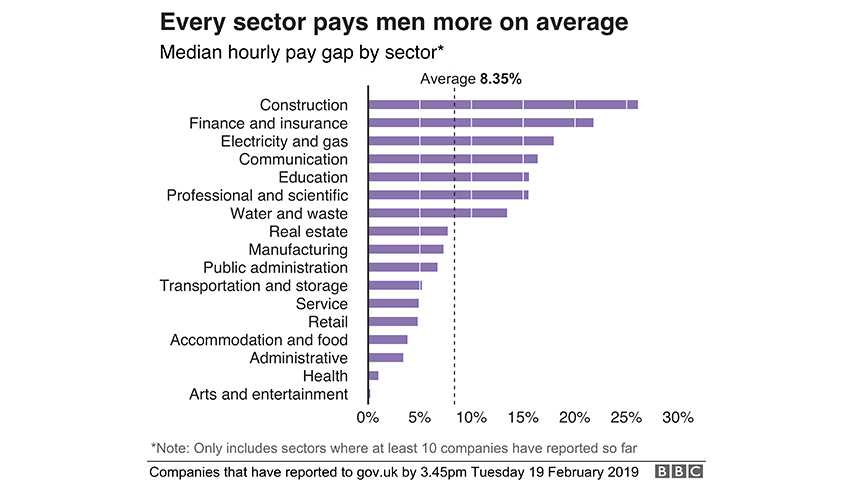-853X543.jpg)
‘Gender pay gap wider than last year,’ reports BBC
by Shruthi Venkatesh February 25 2019, 7:40 pm Estimated Reading Time: 3 mins, 39 secsA research done by BBC found that in 4 in 10 companies the pay gap between the middle-earning woman and the middle-earning man had significantly increased. This is something different to unequal pay. A dead-line was given for all the private sectors – to be as 4th April. So far, only about 10% of employers have reported their latest figures. The results were said to be that out of 1,146 companies, the hourly median gender pay gap reported is 8.4% - a slight improvement from that of last year’s 9.7%.

Every sector pays ... average (BBC).png
To check on the reports which were noticed on 19th February, it is shown
74% report a pay gap favouring men
14% have a pay gap favouring women
12% report no pay gap.
“Closing the gender pay gap is not a quick fix, and employers may take time to see their gap close as they implement long term action plans,” the Government Equalities Office said in a statement.
BBC reports that Iceland became the first country to make companies responsible for paying men and women equally. Campaigners have said the increasing gap is concerning and more needs to be done to implement change. “Within the UK alone, the gender pay gap is set to be closed in approximately 55 years; an abysmal reality that perfectly describes the UK professional arena’s ability to invoke social change,” Hephzi Pemberton, founder of Equality Group, a company which implements diversity in businesses, told RightsInfo. “Why, with so much focus and the requirement for businesses to improve their gender equality, are we almost a year on and seeing the gender pay gap widen?” she added.
The BBC’s analysis refers purely to private sector firms from April 2017 – April 2018. According to the available data, the gender pay gap at energy giant Npower has grown from 13% to 18% since it last reported. The gap at car mechanics chain Kwik Fit grew from a negative gender pay gap - when women get paid more - of minus 15.2% to a positive one of 14%. The gap at airline and tour operator Virgin Atlantic also widened, from 28.4% to 31%. A company spokeswoman said the industry had been “historically more appealing to men”, although it was trying to recruit more women. “Last year most of our female employees were in our upper quartile of salary bands, however over the course of the last 12 months a number of these senior employees have left the company, a shift which has skewed our figures.” Campaigners are hopeful that this increase does not signify a lack of desire to create better equality in the workplace.
The Equality and Human Rights Commission (EHRC) - which enforces the gender pay gap rules - said that forcing companies to report their pay gaps was not enough to eliminate pay inequalities. “We believe that it should be mandatory for employers to publish, alongside their pay gap data, action plans with specific targets and deadlines,” said chief executive Rebecca Hilsenrath.
Sam Smethers, the chief executive of the equality campaign group the Fawcett Society, told RightsInfo that more needs to be done to hold companies accountable and improve the pay gap. “Women will be wondering what is going on, but the reality is this is a marathon, not a sprint,” Smethers said.
“It will take a five-year strategy with a focused action plan to produce results, combined with a tougher reporting regime. We also need to address all the causes of the pay gap, provide real transparency with pay data so that women can challenge pay discrimination; more generous leave for dads that they can afford to take and to make every job a flexible working job, unless there is a business reason not to,” she added.
One year is not long for organisations to make significant and permanent impression in their gender pay gaps. And many organisations won’t have had that long because this data is based on the snapshot dates of 31 March 2018 (public sector) and 5 April 2018 (private sector) - just a day after the deadline for publishing the 2017 results.
Organisations need to set realistic goals - the government has suggested that most will need at least five years to implement change. But change will only happen if organisations take concrete, measurable and targeted actions to reduce their GPG.





-173X130.jpg)
-173X130.jpg)
-173X130.jpg)
-173X130.jpg)
-173X130.jpg)
-173X130.jpg)
-173X130.jpg)